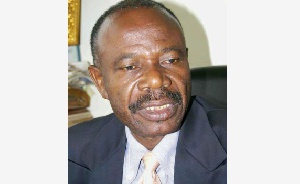 NPP business mogul and a founding member of the party, Mr. George Ayisi Boateng
NPP business mogul and a founding member of the party, Mr. George Ayisi Boateng
The New Patriotic Party (NPP) business mogul and a founding member of the party, Mr. George Ayisi Boateng has said the 15% increment of transportation fares is and indictment on the government.
“The increment will bring additional hardship to the ordinary Ghanaian and I do not understand why government should allow this to happen” he said on Nhyira Fm .
“The price of petroleum products are going down and one will expect the fares to also go down . What is happening in the Transport Ministry.”, he asked
Mr. Ayisi Boateng who owns petrol filling stations across the Ashanti region described the situation aa “abnormal” at the time government has cut down cost on the importation of spare parts.
A deputy Minister-designate for Information, Kojo Oppong Nkrumah who agreed with the concerns of the NPP stalwart when he was called on phone is also worried the new fares will effect on Thursday.
He stated that NPP government under President Akufo-Addo wishes the fares are reduced but has nothing to do in order to change the situation due to arrangements by the previous National Democratic Congress (NDC) administration.
He said government will be reengaging the various transport unions before the Thursday to see if there are ways the situation could be resolved.
Meanwhile a statement issued and signed by the Chamber of Petroleum Consumers on Tuesday stated;
“Ghanaians have been hard hit with new transport fares set to take effect by Thursday, 6th April, 2017.
This move has become necessary according to the Ghana Private Road Transport Union (GPRTU) due to the rising costs to their operations especially in respect of petroleum product prices at the pumps.
Transport fares prior to this new adjustments were last increased in February 2016, a year and two months ago, at a time when fuel prices were around ghc16.20/ gallon as compared to current average pump prices of around ghc18.44/gallon representing a variance of about 12.14%.
The phenomenon of increased tension between the public transport operators and the commutting public around such times is indeed not a funny one as blames and accusations coupled with fights in public transport sometimes leads to unpleasant outcomes.
The public believes they are being cheated or ripped off whiles the transport operator believes the public ought to understand things have gone up and thus the need to also recoup whatever losses they may be incurring daily. Copec has on countless times suggested a pragmatic shift from this current messy phenomenon where a few people will have to meet and decide on increases in transport fares to a legally regulated regime which is transparent and can be understood and easily predicted by all parties.
The need for a comprehensive transport fare policy which makes provisions for both upward and downward reviews or adjustments using certain specific indicators for easy understanding and prediction by the public is not only necessary but should be treated with the urgency it demands by the Ministry Of Transport.
The current increases though within reasonable limits still seem pretty harsh considering the economic climate pertaining in the country at the moment.
Transport fares for the past years has only gone up and never been reviewed downwards though there have been clear instances when prices of petroleum have been much lower and fares could have seen a downward review instead.
A comprehensive transport fair with clear specifics becomes necessary in a system as ours where a lot depends on the upwards or downwards movement of fuel prices as this will prevent the consumer or commuter from being constantly shortchanged or only asked to pay more every time without any possible window for downward reviews when prices of same petroleum products see some significantly sustained reductions.
A comprehensive transport fare policy could indeed help measure and track the changes that should happen with fares by all and sundry without a few having to sit and decide the fate of the millions at will, without any possibility of a legal challenge when necessary, especially at periods when fares could have also gone down as expectations of fuel prices tumbling in the coming days are rife and rightfully so.
Though there have been challenges in bringing all of the various transport unions under one umbrella, the chamber is optimistic this policy framework will resolve some of those differences if the government brings together all the various stakeholders and transport unions to agree on a workable formula by which they will be bound when the reverse becomes the case. This transport fair policy formula must deal with all possible review situations.
What is important here is the leverage for parties as the, commuters and the transport unions to come to an understanding of what to expect and what not to expect when fuel prices move in upward or downward direction and not only increases”